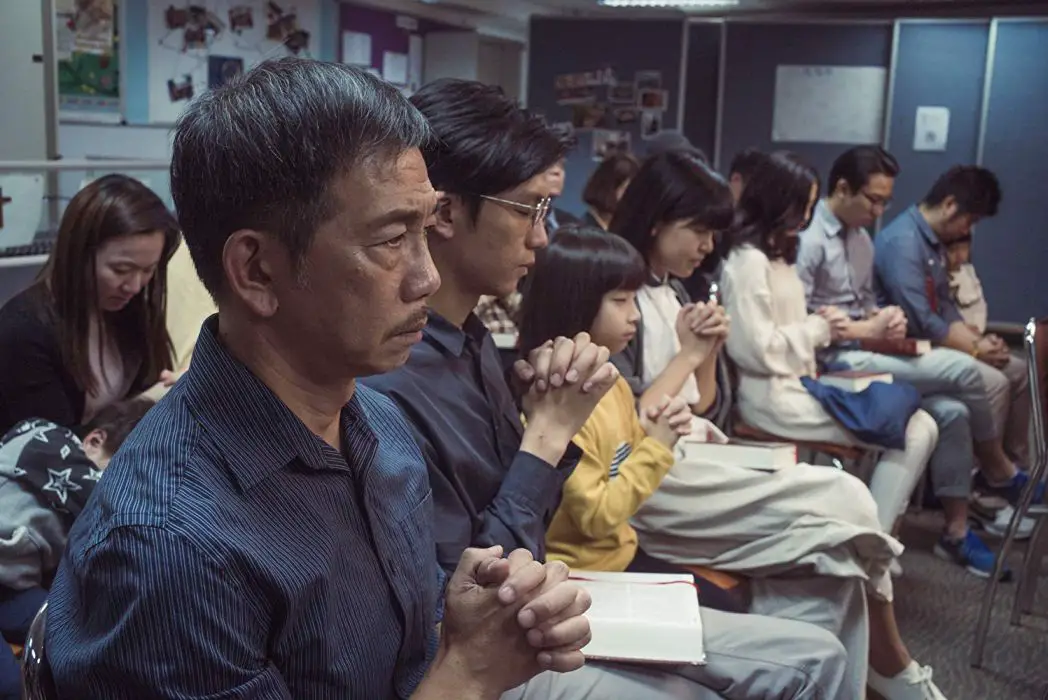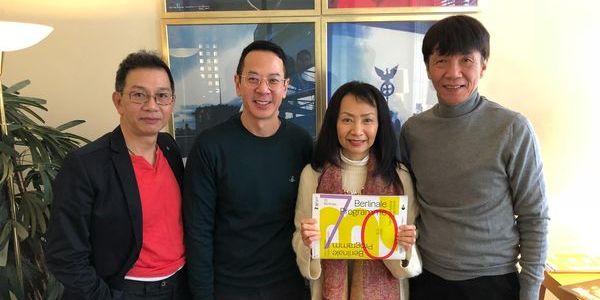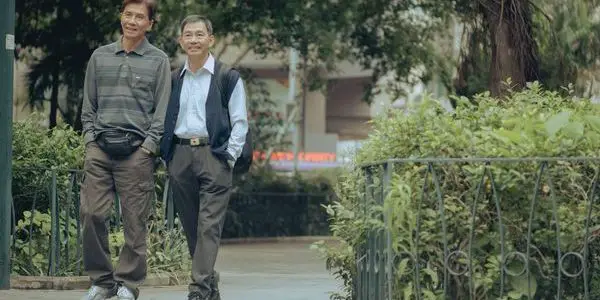Berlinale 2020: Interview With SUK SUK Director Ray Yeung

Wilson is a cinema enthusiast based out of Toronto, Canada.…
The newest film from Ray Yeung, aptly titled Suk Suk (which means ‘uncle’ in Cantonese) examines a budding romance between two men who are approaching their twilight years. A romantic narrative of this nature is certainly unique within the realm of Hong Kong cinema, and the film has already been making waves across Asia after receiving a number of Golden Horse Awards – Taiwan’s equivalent of the Oscars – late last year. The director (Yeung) and cast of Suk Suk (Tai Bo, Ben Yuen, Patra Au) sat down with Film Inquiry to talk about the film when it was shown at the Berlin International Film Festival. The following is an excerpt of our interview with Yeung, with a separate piece to be published on the film’s actors.
Wilson Kwong for Film Inquiry: I think most Western audiences, and maybe even a lot of Asian audiences, won’t necessarily be familiar with LGBTQ films coming out of Hong Kong. This means that Suk Suk might be the first time many people see this community represented in Hong Kong cinema.
Ray Yeung: I think Western audiences will find Suk Suk very interesting because in the Western world, being gay often means you have to be true to yourself and you always have to live life with no regrets. And my movie was inspired by this book (Travis Kong’s book Oral History of Older Gay Men), and there was one interview where someone was asked, “Do you have any regrets in life?” He had been in the closet all his life, but his answer was, “No, I have no regrets because when I come home, my wife will make soup for me. My kids will give me a monthly allowance. I am a success story. Why should I feel any regrets?” I thought that was such an Asian way of seeing something, particularly from people of that generation because he was a refugee from China, and really had nothing. I thought that was a very interesting point of view, and in the Western world, people don’t really see things that way.

I must say, this is such a unique subject matter, and something that I would assume probably doesn’t get a lot of coverage in the news or general media?
Ray Yeung : Nowadays, because of this movie, it is. People are talking about it now because we had some preview screenings in Hong Kong, and most of the audience was not from the LGBTQ community. There were a lot of married couples and people from the film industry who said, “Oh, you know what, I actually never thought of it that way.” For a lot of them, they have this image where LGBTQ people are always young, fabulous, fashionable and muscular. They never actually thought about gay people as being old, because they just have this stereotype in mind.
One thing I noticed was how the film isn’t very dramatic in the conventional sense, despite covering some pretty dramatic subject matter. Why did you decide to make the film in this way?
Ray Yeung: Well, I think it’s because of the book, which is very much borrowed documentation. The author basically just did the interviews and then transcribed exactly what people said. He didn’t add too many other things apart from a few comments. I really liked that because I felt like he was able to preserve the essence of their stories by purely documenting what they said. I tried to make the movie in that same way, making it a documentation of their lives. Of course, the whole story is reimagined, and in the book, none of them actually met each other and fell in love. I took different characters, meshed them together and then reimagined what would happen if they had actually met up.
Can you talk about why you chose the two male lead actors for this film? Specifically Tai Bo, who is primarily known for his work in action movies during his youth.
Ray Yeung: I think it took a long time to find the actors because not a lot of actors want to play elderly gay men, particularly because many are quite conservative. And a few years ago, I watched Philip Yung’s first movie, Glamour Youth, and that’s when I saw Tai Bo‘s performance and thought he was very good and very naturalistic. Not a lot of Hong Kong actors act that way because a lot of them are so used to doing television where they are playing a role instead of just being a character. So I went to see him, and after he read the script, he told me he wanted to do it. He had also showed his wife and she approved it too. After that, I already exhausted all the actors of his age group, so I had to go for someone younger. Ben Yuen is 50-something, so we had to use aging makeup. I had seen him perform in a TV series for a Hong Kong government channel, where he didn’t have a lot of lines. He was just walking around playing a man who was struggling with his daughter’s fate. I thought he was very good and that his body language was really good. So I called him up to talk about the role.
And what about Patra Au? She’s primarily a stage actor, so this was really her first role in a feature film.
Ray Yeung: Well, actresses her age are not easy to find in Hong Kong. A lot of them are doing television work, and like I said before, didn’t like this type of acting very much. So I was asking around and basically cold calling the Hong Kong Repertory Theatre, and their manager suggested Patra. I’ve seen her perform before and knew she was a good actress, but I wasn’t so sure she could do this because theatre is very different from film. So I actually asked her to do a screen test for me, and cast her after that.
Can you talk about whether there was any pushback in you making this film, particularly given its subject matter?
Ray Yeung: Yes, all the time, even right now! There have been a lot of challenges at difference stages. Right off the bat, just trying to find men who were willing to talk to me was a challenge, because a lot of them didn’t want to talk. Finding funding was also difficult because of the subject matter. Anything about the LGBTQ community is already a difficult subject, and when you do something that is about elderly people, people will basically say there’s no box office out there for it. Now comes the stage where even though we’re seeing good results at festivals, distributors are still asking the same questions.

Suk Suk really reminded me of Mad World, which was another independent film from Hong Kong about an intimate social issue (mental health) that played through the festival circuit a few years ago. With commercial filmmaking in Hong Kong not being as strong as it used to be, should we expect to see more films like this?
Ray Yeung: I think the main reason there are more movies like this is because of government funding supporting young filmmakers. Since a lot of the older and more established filmmakers have been going to China to work, no one was really nourishing the younger generation. So it was good that the government stepped in and actually created this fund for a lot of first time directors. A lot of them failed, but some of them came out really good. The movie that you just mentioned (Mad World) was one of the best ones from the batch. And I think it’s good because with a smaller budget, there’s no pressure of box office returns, and people are more willing to cover issues related to actual Hong Kong problems. You therefore have this new crop of films that are different from the usual gangster or martial arts film.
Let’s end off by talking about some of your influences as a filmmaker. I’ve heard you mention Ozu being one of them in past interviews. Was Ozu’s work part of your influences for Suk Suk?
Ray Yeung: Yes. I think Ozu‘s films are very much about family dramas. And one particular thing that I love about Ozu films is that the father figure is usually very reserved and restrained, and his main desire is to marry off his daughter. It’s a kind of father and daughter relationship that is very tender, but at the same time, also very distant. I think that really reflects a lot of Asian cultures. So in Suk Suk, I really wanted that element to be shown in the relationship between Tai Bo‘s character and his daughter. The scene where he gives the taxi to her husband, and then they walk away in the morning to have breakfast together, that is one of my favourite scenes. I think a lot of people who watched it cried as well because it just reminded them so much of their own father.
What about influences in terms of filmmakers from Hong Kong?
Ray Yeung: Of course, Stanley Kwan is one of them because he’s one of the first filmmakers to come out. He also did a very gutsy LGBTQ movie (Lan Yu), which was very much an influence for me. There was also The Actress (also known as Center Stage), which was very different from other Hong Kong movies at the time. It really broke a lot of genres and used this expressionistic mixing of the documentary style. Looking back at his films, I don’t actually know a lot of other Hong Kong filmmakers from that era who were willing to play around with cinema that much. I thought he was one of the most interesting mainstream filmmakers of that era.
Film Inquiry would like to thank Ray Yeung for taking the t ime to speak with us.
Does content like this matter to you?
Become a Member and support film journalism. Unlock access to all of Film Inquiry`s great articles. Join a community of like-minded readers who are passionate about cinema - get access to our private members Network, give back to independent filmmakers, and more.
Wilson is a cinema enthusiast based out of Toronto, Canada. He escapes from his day job by writing random thoughts about cinema on the internet. Although he has a longstanding penchant for Hong Kong cinema, he considers himself to be an advocate for Asian cinema in general. He has been attending the Toronto International Film Festival every year since 2005, and more of his work can be found on his website: www.wilson-kwong.com.













